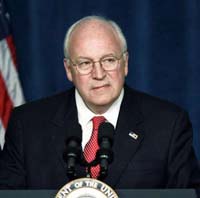Cheney meets Japanese emperor, tells troops U.S. won't relent in Iraq war
U.S. Vice President Dick Cheney met with Japan's emperor on Wednesday and flew to a U.S. aircraft carrier, where he told thousands of cheering American troops that their country will not relent in the war on terror.

Cheney, who arrived in Japan on Tuesday, was given a 19-gun salute as he boarded the USS Kitty Hawk and began his 20-minute address to about 4,000 troops in the hangar bay.
He praised Japan as "one of America's closest allies," and said relations have never been better, adding that Tokyo and Washington "understand our duties."
Right now, Washington's duty, he said, is to remain on the attack in its global campaign against terrorism.
"America will stay on the offensive on the war on terror," he said. "The American people will not support a policy of retreat."
Cheney also reaffirmed Washington's commitment to the increasingly unpopular war in Iraq.
"We want to complete the mission, we want to get it done right, and then we want to come home, with honor," he said.
Cheney's brief visit to Japan he was to depart early Thursday is a gesture of appreciation to Tokyo, which has been one of Washington's most valuable allies in the war on terror, sending troops to Iraq and deploying logistical help for U.S. and coalition forces in Afghanistan.
Cheney was to have dinner Wednesday with Prime Minister Shinzo Abe, and meet with Foreign Minister Taro Aso.
On Thursday, he was to meet the parents of a Japanese schoolgirl abducted by North Korean agents in 1977. Cheney was then slated to fly to Australia and the tiny U.S. Pacific island of Guam.
Earlier Wednesday, Cheney and Tokyo's top government spokesman, Yasuhisa Shiozaki, reiterated their countries' intentions to collaborate closely on missile defense and the realignment of U.S. troops stationed in Japan.
They also concurred in praising the recent six-nation agreement on North Korea's nuclear program as an important step forward, Japan's Foreign Ministry said in a statement.
Japan and the United States are seeking to closely coordinate their stance on North Korea, which has rattled the region with its nuclear ambitions and its first atomic bomb test last October but earlier this month it agreed to shut down its main nuclear reactor in exchange for energy aid and other incentives.
Japan has declined to contribute aid, however, until the issue of past abductions of its citizens by North Korea is resolved. North Korea has admitted kidnapping Japanese, but has not provided a full accounting of the victims, Japan believes.
Prime Minister Abe said he planned to explain his government's position to Cheney when they met later Wednesday, and that "the U.S. has already expressed its understanding on this issue."
The U.S. has about 50,000 troops stationed throughout Japan under a mutual security pact that dates back to the 1960s.
Tokyo and Washington have been reworking that alliance, saying they are trying to make the presence more effective and "interoperative." They are also developing a joint missile defense shield, reports AP.
The U.S. recently deployed state-of-the-art Patriot missiles on Japan's southern island of Okinawa, while Japan has been increasing its own missile defense capabilities around its cities.
The two forces are likely to work closer together in the years to come, with Japan taking on a more significant role in its own defense and in international peacekeeping operations.
Subscribe to Pravda.Ru Telegram channel, Facebook, RSS!





